Keep the Recyclables Stream Clean!
Last year, China announced “National Sword,” a change in its import policies that has a profound impact on recycling efforts in California. Strict new contaminant thresholds have been applied to certain grades of paper, and import bans on mixed paper and various grades of post-consumer plastics are in effect.
Recyclables continue to be collected and recovered. Mixed paper makes up over 40% of the material in the blue cart. There are very limited markets for mixed paper and various plastic containers.
We thank you for your efforts! See below for more information on how you can improve the recyclables stream.
Proper Sorting is a Must!
The cleanest and most efficient sorting starts with you, the generator. Please remember to:
- SUPPORT THE SORT!
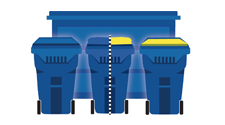
Please place recyclable materials only in your blue split or dedicated recyclables carts and/or bins. For a list of what belongs, click here.
- JUST SAY “NO” TO CONTAMINANTS!
Garbage, Food Scraps, Yard Trimmings and Hazardous Waste, such as household batteries and lightbulbs, DO NOT belong in the blue split or dedicated recyclables carts and/or bins. For a list of contaminants, click here.
- MAINTAIN A CLEAN STREAM!
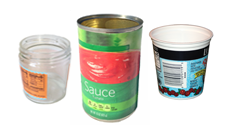
When possible, empty and rinse recyclable plastic, metal and glass food containers before placing them in the containers side of the blue split recyclables cart or the blue dedicated recyclable containers cart. Remember food-soiled paper belongs in the food scraps side of your gray garbage/food scraps split cart or dedicated food scraps cart.
- KEEP AN EYE ON SIZE!
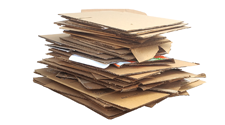
Corrugated cardboard and paper boxes should be flattened and large pieces cut to 2’ x 2’ or smaller. This prevents materials from getting stuck in the cart or blocking the split hopper of the collection vehicles.
Reduce, Refuse & Reuse Before You Recycle!
Small changes in your purchasing habits and daily routine can make a big impact in reducing your waste and recycling stream!
- REPAIR INSTEAD OF PURCHASE.
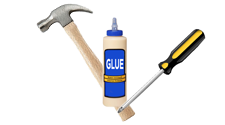
Before you replace an item, see if it can be repaired. If you do purchase something new, find the highest quality/longest lasting most durable option possible.
- OPT FOR USED PRODUCTS.
Reuse what you already have or purchase a “gently used” item from a resale shop or website. Share/trade items with friends and neighbors.
- CHOOSE REUSABLES.
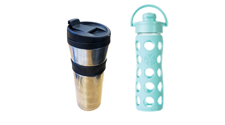
Shop with reusable bags and totes, bring your travel mug to the coffee shop and carry a reusable water bottle with you!
- AVOID PURCHASING PRODUCTS WITH EXCESSIVE PACKAGING.
Choose products with minimal, compostable or recyclable packaging. Buy large sizes or in bulk.
- AVOID SINGLE-SERVE OR SINGLE-USE ITEMS.
Skip the straw and single-serve condiments at restaurants.
- STOP UNWANTED MAIL.
40% Of the material in the recycling is paper. Use these three easy steps to reduce paper in the blue recyclables split cart.
- Remove your address from direct mail registries at: https://www.directmail.com/mail_preference/.
- Discontinue unwanted catalogs at: CatalogChoice.org.
- Prevent automatic phonebook deliveries at: YellowPagesOptOut.com.
- AVOID FOOD WASTE.
40% of food is wasted in America every year. More information and helpful tips can be found at www.savethefood.com.
PLEASE REMEMBER, HAZARDOUS WASTE DOES NOT BELONG IN ANY MILPITAS SANITATION CART OR BIN.
Household hazardous waste items like pesticides, fertilizers, pool & photo chemicals, paint/varnish, toxic cleaning products, smoke detectors, mercury-containing items (thermometers, CFLs/fluorescent lights, etc.), unwanted medications, and sharps (needles, lancets, etc.) should never be thrown in the trash or recycling bin, flushed down the toilet, or dumped down the drain or storm sewer. Click here for more household hazardous waste information.
Household hazardous waste needs to be taken to a hazardous waste collection facility. Santa Clara County Hazardous Waste Program provides Saturday drop-off centers for medicines, cleaning chemicals, and batteries, etc. There is no charge for Milpitas residents to use this service. To participate, make an appointment online or over the phone. For more information and a list of Santa Clara County’s free collection facilities: visit – HHW.org or call – 408-299-7300.
To view Media Response to the Recycling Markets Crisis, please click here.
